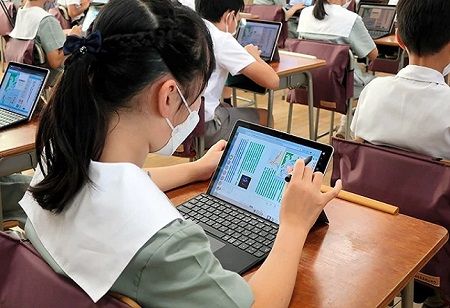According to sources, Japan's Education Ministry is considering allowing digital textbooks to become official, thereby being used as primary school textbooks. Currently, digital textbooks are used as supplemental teaching materials in place of traditional paper textbooks. The ministry is also considering introducing a new system where local education boards would be allowed to opt for either paper or digital textbooks for the students.
It could fundamentally alter the nature of textbooks in Japan's education system, which has long relied on paper as the standard medium. The issues are to be presented by the Ministry of Education, Culture, Sports, Science and Technology, or MEXT, to the Central Council for Education at a meeting on Tuesday. This proposal is sure to ignite some considerable debate on the matter.
Digital textbooks are essentially digitized versions of paper textbooks, with the same content but viewed on electronic devices provided to students. If the ministry's proposal goes through, digital textbooks could be officially sanctioned as school textbooks. As part of this change, they would be subject to the same government screenings for accuracy and appropriateness as paper textbooks. Besides, these digital textbooks would be available free of charge to the students, just like the paper textbooks in compulsory education.
One of the main questions that the ministry would want to consider is that whether digital textbooks are promoted as substitute teaching materials to become official schoolbooks. Such a trend would mean that these digital textbooks will face stringent government scrutiny to receive free distribution, similar to the one digital gets. The second proposal under this scheme suggests provision for local boards of education to decide in the medium of paper or digital textbooks which would be suitable for the schools.
Based on the discussions within the working group, the education ministry plans to draft an interim report by next month. The interim report will provide details of steps to be taken to implement the proposal, which would include any legal amendments needed to make digital textbooks official school materials. The ministry would like to alter the School Education Law by fiscal 2026, and plans to be in a position where it can actually implement digital books into the country's curriculum, starting in fiscal 2030.
In this current structure that exists within the School Education Law of Japan, paper textbooks become the official textbook of the schools, whereas electronic textbooks are categorised as learning materials which can potentially replace the standard textbooks. Digital textbooks can be given the official status where students can use them to learn entirely from digital materials without necessarily having physical textbooks. This way, learning becomes more flexible and personalized, allowing students to study using their digital devices.
However, there are experts who do not believe that the usage of digital textbooks should be expanded. Some research has suggested that students will have a lower retention rate on memory than in the case of paper textbooks. Other experts fear negative impacts on students' health. Some of the main concerns are regarding the effects on eyesight deterioration due to screen time exposure for extended periods.
Prof. Kuniyoshi Sakai, of the University of Tokyo, has expressed his opinions on the shift and warned that "it may be too early to give official status to digital textbooks before their efficacy is fully ascertained". "It remains unclear whether digital textbooks are effective as paper ones, and such a decision might have a great influence on children's academic abilities", Sakai explained. He urged the Ministry to proceed carefully, considering the long-term implications for students’ education.

